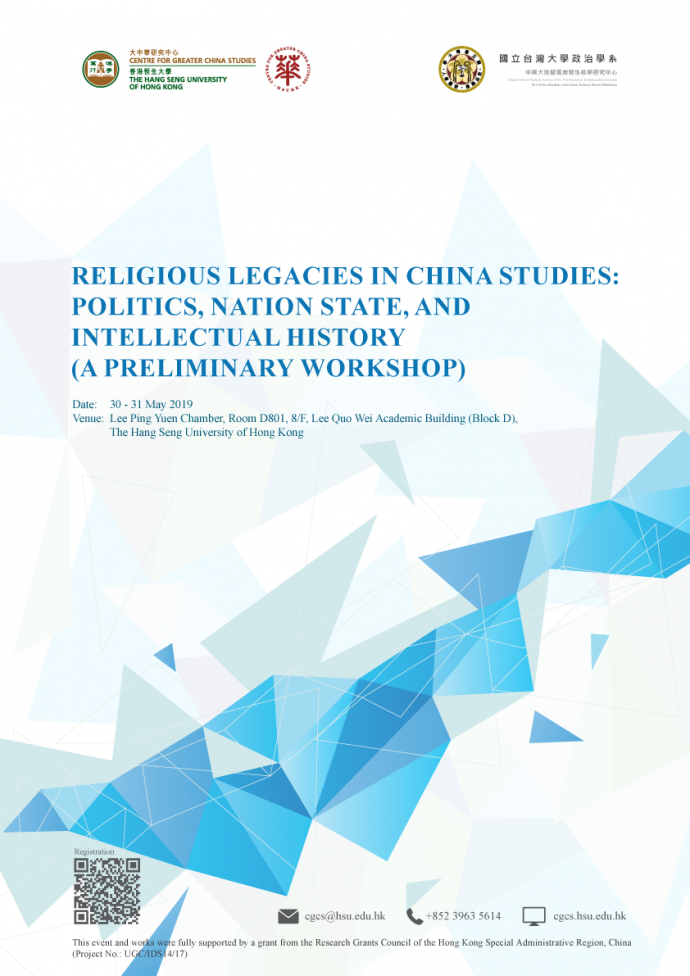Introduction
In Huntington’s formulation, civilizations are primarily religious. For him, the clash of civilizations takes place between sovereign entities. In this light, sovereignties that inform contemporary international relations and governance have historically arisen from the European religious war. Thus, the expansion of European international relations encounters multiple worlds that mingle. Along with these processes, an intellectual history informed by the religious beliefs and practices has emerged to make sense of strangers in self and self in strangers. Amidst the perceived rise of China in the 21st century, this conference aims to rediscover these religious legacies in ways to understand China in terms of identities, practices, institutions, and its many other meanings and constituents. Students of religious studies and China/Chinese studies get together in this conference to reflect upon scholarly liaison provided by the missionaries, revolutionaries, and nationalists at different sites, geo-culturally as well as textually.
Programme Rundown
Date : 30 – 31 May 2019 (Thursday – Friday)
Venue: Lee Ping Yuen Chamber (D801), 8/F, Lee Quo Wei Academic Building (Block D), The Hang Seng University of Hong Kong
Time: (Day 1) 10:00-17:30; (Day 2) 09:30-12:00
| [Day 1] 30 May 2019 (Thursday) | |
| 10:00 – 10:30 | Registration |
| 10:30 – 10:45 | Opening Remarks Group Photo |
| 10:45 – 12:15 | Session 1: Missionary Legacies Russian Orthodox Church and Its Influences on China Studies in Russia Professor Alexei D. VOSKRESSENSKI Moscow State Institute for International Relations (University) – MGIMO (U) China and Sinitic Languages through the Lenses of the Authors of the Chinese Repository Dr. Luisa M. PATERNICÒ University of Naples L’Orientale The Influence of Western Approaches to the Study of Lao-Zhuang in the Understanding of China Dr. Thomas MICHAEL Beijing Normal University |
| 12:15 – 14:30 | Lunch |
| 14:30 – 15:45 | Session 2: Political Agency
The Propagation of Japanese Buddhism in China: 1910-40s Professor Shin KAWASHIMA University of Tokyo Beyond China’s Threat: The Contextual Theology of the Presbyterian Church in Taiwan Professor Chih-yu SHIH 石之瑜教授 National Taiwan University Ms. Samantha TSENG Taiwan Church News Alternative Ways to Communism: Jewish Contributions to the Chinese Revolution Professor Yitzhak SHICHOR (Absent) University of Haifa |
| 15:45 – 16:15 | Break |
| 16:15 – 17:30 | Session 3: Embedded Nation-State
Zen Rationality and Nationalism in a Post-Suzuki Era Dr. Pei-ying LIN林佩瑩博士 Fu Jen Catholic University The Nature and the Principles of Xi’s Governance in China: A Study of the Religious Policy and the Sino-Vatican Relationship Dr. Anselm, Wing Kwan LAM 林榮鈞博士 The Hang Seng University of Hong Kong Nationalism as a Secularized Cosmology? Critical Reflections from Asia Professor Giorgio SHANI (Absent) International Christian University |
| 18:00 – 20:00 | Reception Dinner |
| [Day 2] 31 May 2019 (Friday) | |
| 09:30 – 11:00 | Session 4: Local Knowledge
Xu Fancheng and Huang Xinchuan: Introducing Hinduism to China Professor Tansen SEN NYU Shanghai Huiru (回儒) Movement in Chinese Studies Dr. Ertuğrul CEYLAN Ankara University A Reflection on the Development of Buddhist Psychology in China Dr. Joe, Kai Chung POON 潘啟聰博士 (Absent) The Hang Seng University of Hong Kong As a Practice of Regeneration of Local Knowledge: The Revival of Mongolian Shamanism in China Dr. Saijirahu BUYANCHUGLA (Absent) Inner Mongolia University for Nationalities |
| 11:00 – 12:00 | Business Meeting and Conclusion |
| 12:00 – 14:00 | Lunch |
List of Participants
- Dr. Saijirahu BUYANCHUGLA (Inner Mongolia University for Nationalities)
- Dr. Ertuğrul CEYLAN (Ankara University)
- Professor Shin KAWASHIMA (University of Tokyo)
- Dr. Anselm, Wing Kwan LAM 林榮鈞博士 (The Hang Seng University of Hong Kong)
- Dr. Pei-ying LIN 林佩瑩博士 (Fu-Jen Catholic University)
- Dr. Thomas MICHAEL (Beijing Normal University)
- Dr. Luisa M. PATERNICÒ (University of Naples L’Orientale)
- Dr. Joe, Kai Chung POON 潘啟聰博士 (The Hang Seng University of Hong Kong)
- Professor Tansen SEN (NYU Shanghai)
- Professor Giorgio SHANI (International Christian University)
- Professor Yitzhak SHICHOR (University of Haifa)
- Professor Chih-yu SHIH 石之瑜教授 (National Taiwan University)
- Professor Alexei D. VOSKRESSENSKI (Moscow State Institute for International Relations (University) – MGIMO (U))
*This event was fully supported by a grant from the Research Grants Council of the Hong Kong Special Administrative Region, China (Project No.: UGC/IDS14/17)

